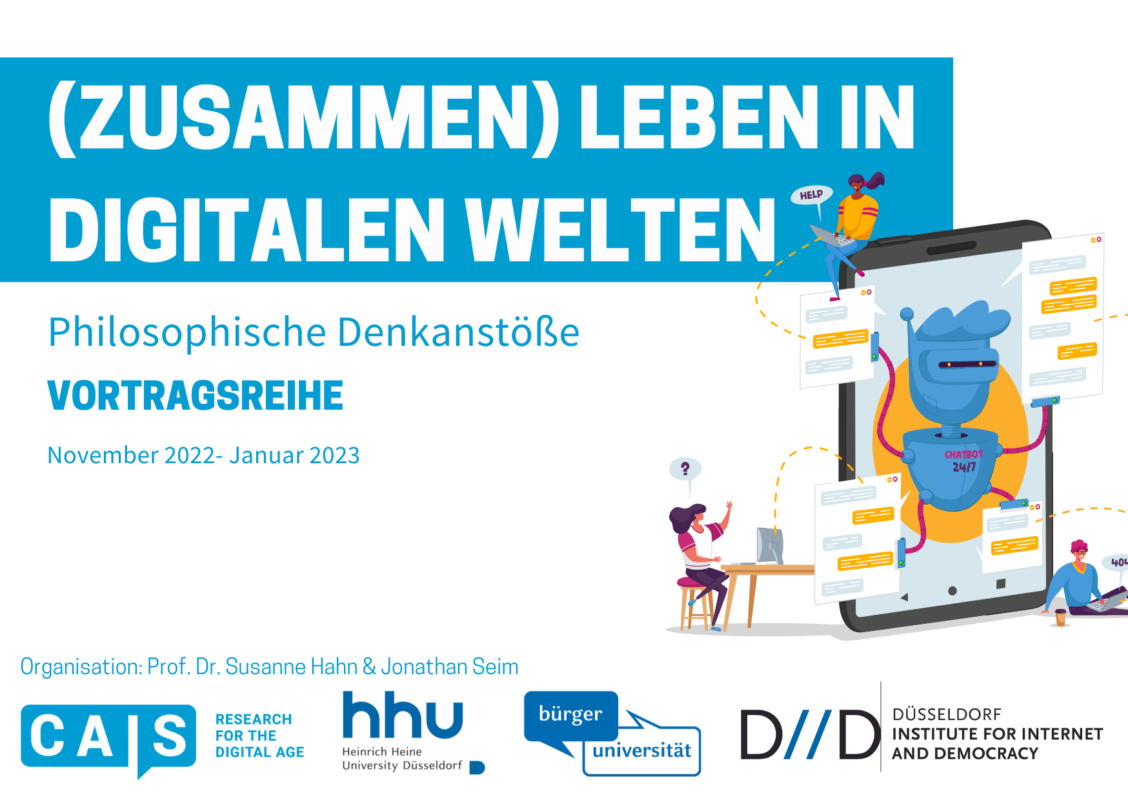The lecture series provides food for thought for a successful (co)life in digital worlds. The lecture series organised by Prof. Dr. Susanne Hahn and Jonathan Seim as part of the Citizens’ University provides food for thought on shaping individual lifestyles and living together in modern societies. It is the result of a cooperation between CAIS Bochum (from our ELSI – Ethical, Legal and Social Issues team), Heinrich Heine University Düsseldorf (HHU) and the Düsseldorf Institute for Internet and Democracy (DIID) and takes place as part of the HHU’s Citizens’ University programme.
The project “Digital Ethics” at CAIS is funded by the Mercator Foundation.
All events will take place from 6.30 p.m. to 8 p.m. at the Haus der Universität (Schadowplatz 14, 40212 Düsseldorf) and will also be streamed live via the HHU YouTube channel.

21.11.2022: Prof. Dr. Albrecht Schmidt (TU Munich):
Information drought despite news flood – How digital news is changing our society
An unimaginable number of things happen in the lives of almost 8 billion people. With Twitter, Instagram and Co, this results in a global flood of news. Algorithms are needed to select what individuals see. Does this make us better informed or is it easier to manipulate us?
08.12.2022 Dr. Hauke Behrendt (University of Stuttgart):
Participatory justice in working life: The opportunities of digitalisation
Despite all the justified concerns about new waves of automation, it is often overlooked that digitalisation also holds opportunities to ensure participation in the world of work for people who would otherwise be affected by exclusion. If we make the right use of its potential, digitalisation can thus serve social progress.
19.12.2022: Prof. Dr. Thomas Schmaus (Alanus University, Alfter)
“There’s still something to be done!” On the encouragement and demand for self-optimisation in times of digitalisation
In times of digitalisation, those who want to realise themselves – in a well-modernised way – have a strategy at their disposal in the form of the concept of self-optimisation, which seems to do justice to their own interests and societal expectations at the same time. But does it really promote a successful life – or does it rather hinder it?
09.01.2023: Prof. Dr Micha Werner (University of Greifswald):
Prerequisites for responsible understanding in digital contexts
Digital technologies are also transforming forms of social communication. What changes in the preconditions and possibilities of responsible understanding arise and how do specific decisions about the technical design of digital communication platforms have an impact?
16.01.2023: PD Dr. Jessica Heesen (University of Tübingen):
Digitalisation and the culture of dying
The Digital Afterlife Industry (DAI) enables “living on” and interaction with digital representations of the deceased. It opens up far-reaching questions with regard to the culture of dying, post-mortem personal rights and the contradictions between reverence and data economy.
26.01.2023 Prof. Dr Eva Weber-Guskar (University of Bochum):
Feelings for replicas? On the possibility of a relationship with a chatbot
Millions of people converse with the social chatbot Replika via an app. Many even develop positive feelings for Replika.
Can we talk about a real relationship here? Can a relationship with a chatbot enrich a human life or is it fundamentally problematic?